Effective Stress Management: Implementing a Five-Step Program
VerifiedAdded on 2023/06/13
|7
|2739
|450
Practical Assignment
AI Summary
This assignment presents a five-step stress management program designed to help individuals recognize, understand, and manage daily stress. The program begins with a stress diary to identify personal stressors and reactions, followed by a burnout assessment to gauge emotional and physical exhaustion. Key components include recognizing stress symptoms, developing coping skills through attitude adjustment and lifestyle changes, and organizing life to minimize triggers. The program emphasizes prioritizing tasks, practicing relaxation techniques, seeking support from others, and making time for personal well-being. It also addresses the importance of a balanced diet, regular exercise, and reducing stimulants like caffeine and alcohol. Ultimately, the program aims to empower individuals to gain control over their stress levels and make healthy changes for a more balanced and stress-free life. Desklib provides this assignment and many more resources for students.
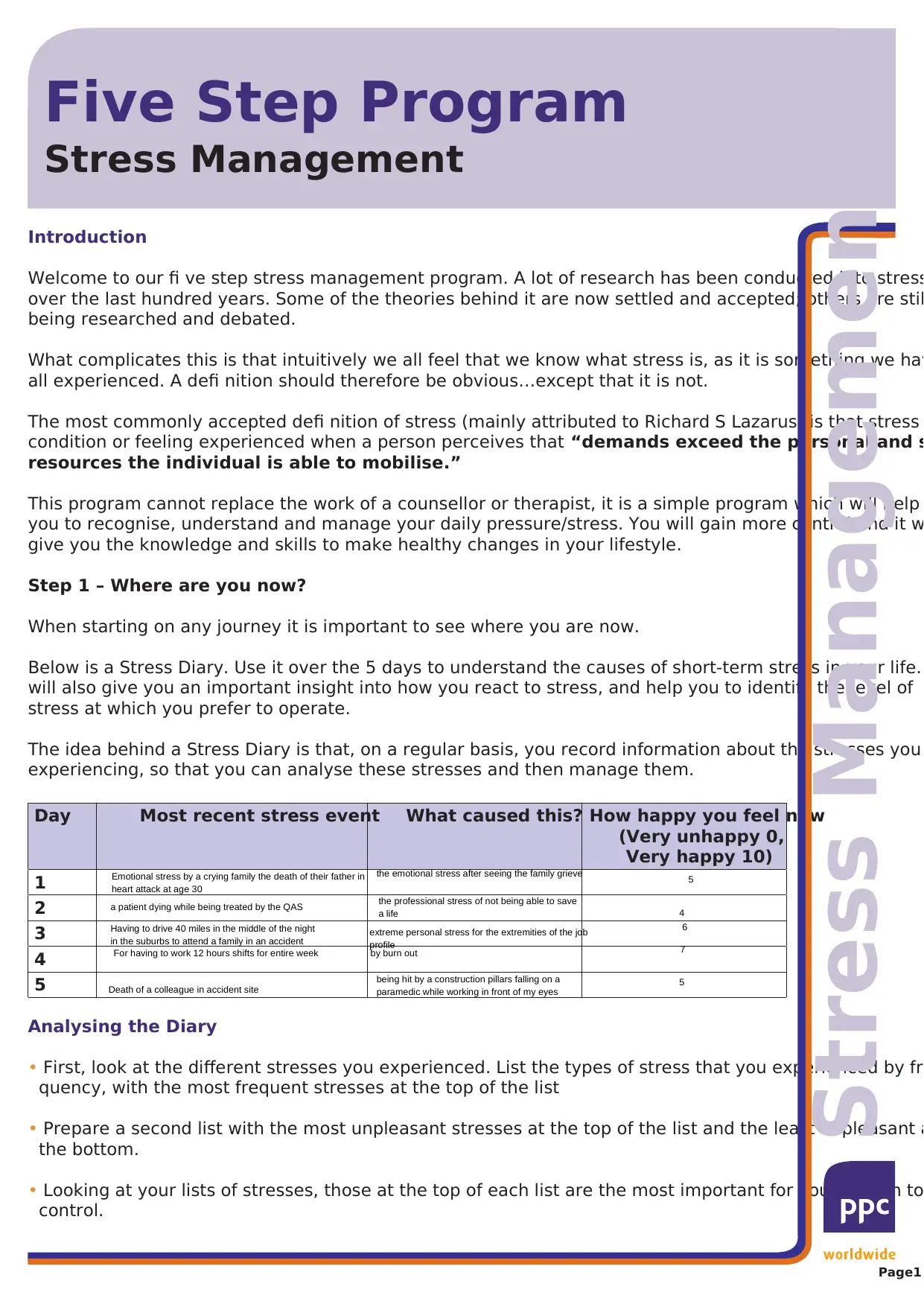
Page1
Five Step Program
Stress Management
Introduction
Welcome to our fi ve step stress management program. A lot of research has been conducted into stress
over the last hundred years. Some of the theories behind it are now settled and accepted; others are stil
being researched and debated.
What complicates this is that intuitively we all feel that we know what stress is, as it is something we hav
all experienced. A defi nition should therefore be obvious…except that it is not.
The most commonly accepted defi nition of stress (mainly attributed to Richard S Lazarus) is that stress
condition or feeling experienced when a person perceives that “demands exceed the personal and s
resources the individual is able to mobilise.”
This program cannot replace the work of a counsellor or therapist, it is a simple program which will help
you to recognise, understand and manage your daily pressure/stress. You will gain more control and it w
give you the knowledge and skills to make healthy changes in your lifestyle.
Step 1 – Where are you now?
When starting on any journey it is important to see where you are now.
Below is a Stress Diary. Use it over the 5 days to understand the causes of short-term stress in your life.
will also give you an important insight into how you react to stress, and help you to identify the level of
stress at which you prefer to operate.
The idea behind a Stress Diary is that, on a regular basis, you record information about the stresses you
experiencing, so that you can analyse these stresses and then manage them.
Day Most recent stress event What caused this? How happy you feel now
(Very unhappy 0,
Very happy 10)
1
2
3
4
5
Analysing the Diary
• First, look at the different stresses you experienced. List the types of stress that you experienced by fre
quency, with the most frequent stresses at the top of the list
• Prepare a second list with the most unpleasant stresses at the top of the list and the least unpleasant a
the bottom.
• Looking at your lists of stresses, those at the top of each list are the most important for you to learn to
control.
Stress Management
Emotional stress by a crying family the death of their father in
heart attack at age 30
the emotional stress after seeing the family grieve 5
the professional stress of not being able to save
a life 4
extreme personal stress for the extremities of the job
profile
6
For having to work 12 hours shifts for entire week by burn out 7
Death of a colleague in accident site
a patient dying while being treated by the QAS
Having to drive 40 miles in the middle of the night
in the suburbs to attend a family in an accident
being hit by a construction pillars falling on a
paramedic while working in front of my eyes
5
Five Step Program
Stress Management
Introduction
Welcome to our fi ve step stress management program. A lot of research has been conducted into stress
over the last hundred years. Some of the theories behind it are now settled and accepted; others are stil
being researched and debated.
What complicates this is that intuitively we all feel that we know what stress is, as it is something we hav
all experienced. A defi nition should therefore be obvious…except that it is not.
The most commonly accepted defi nition of stress (mainly attributed to Richard S Lazarus) is that stress
condition or feeling experienced when a person perceives that “demands exceed the personal and s
resources the individual is able to mobilise.”
This program cannot replace the work of a counsellor or therapist, it is a simple program which will help
you to recognise, understand and manage your daily pressure/stress. You will gain more control and it w
give you the knowledge and skills to make healthy changes in your lifestyle.
Step 1 – Where are you now?
When starting on any journey it is important to see where you are now.
Below is a Stress Diary. Use it over the 5 days to understand the causes of short-term stress in your life.
will also give you an important insight into how you react to stress, and help you to identify the level of
stress at which you prefer to operate.
The idea behind a Stress Diary is that, on a regular basis, you record information about the stresses you
experiencing, so that you can analyse these stresses and then manage them.
Day Most recent stress event What caused this? How happy you feel now
(Very unhappy 0,
Very happy 10)
1
2
3
4
5
Analysing the Diary
• First, look at the different stresses you experienced. List the types of stress that you experienced by fre
quency, with the most frequent stresses at the top of the list
• Prepare a second list with the most unpleasant stresses at the top of the list and the least unpleasant a
the bottom.
• Looking at your lists of stresses, those at the top of each list are the most important for you to learn to
control.
Stress Management
Emotional stress by a crying family the death of their father in
heart attack at age 30
the emotional stress after seeing the family grieve 5
the professional stress of not being able to save
a life 4
extreme personal stress for the extremities of the job
profile
6
For having to work 12 hours shifts for entire week by burn out 7
Death of a colleague in accident site
a patient dying while being treated by the QAS
Having to drive 40 miles in the middle of the night
in the suburbs to attend a family in an accident
being hit by a construction pillars falling on a
paramedic while working in front of my eyes
5
Paraphrase This Document
Need a fresh take? Get an instant paraphrase of this document with our AI Paraphraser
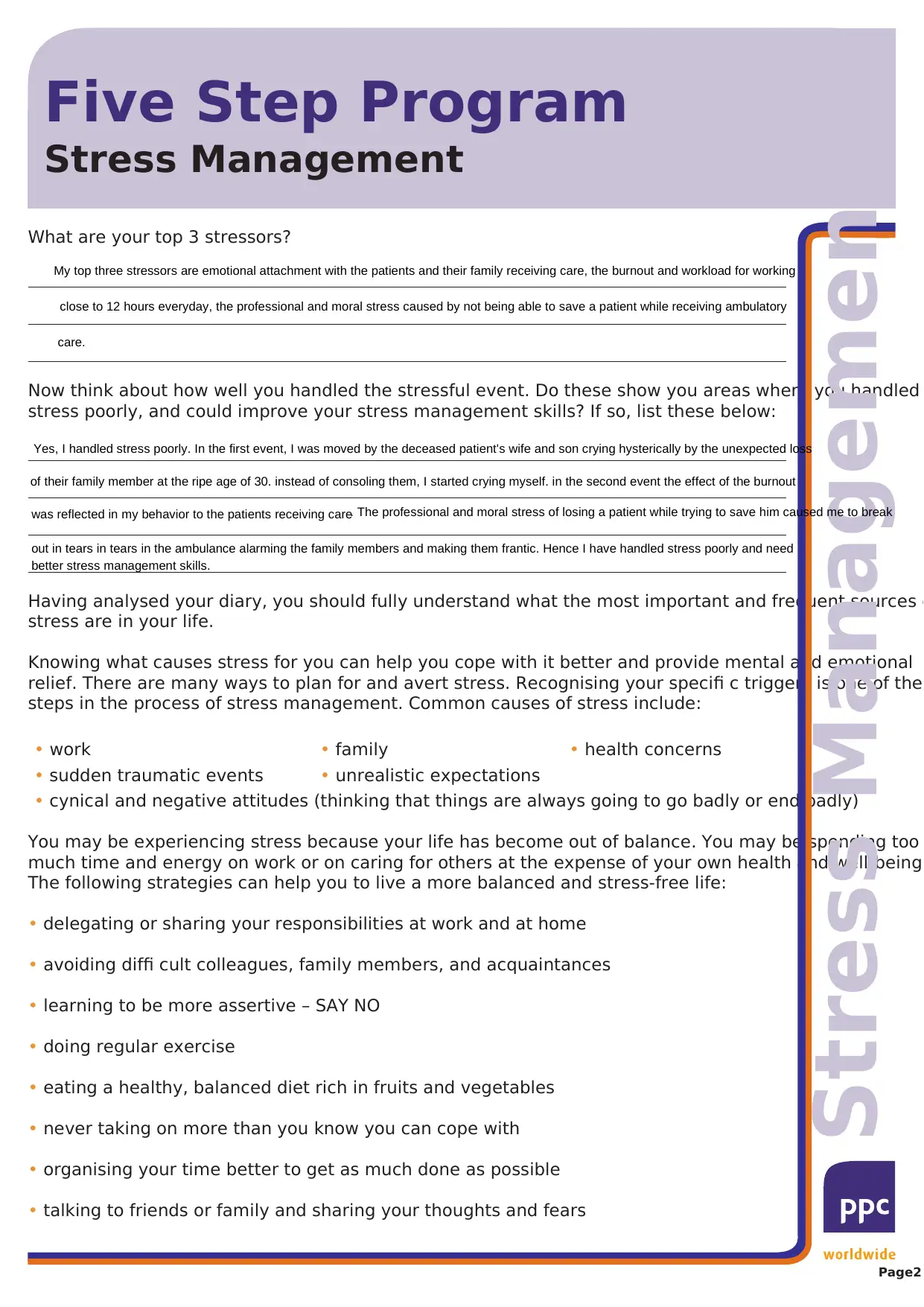
Page2
Five Step Program
Stress Management
What are your top 3 stressors?
Now think about how well you handled the stressful event. Do these show you areas where you handled
stress poorly, and could improve your stress management skills? If so, list these below:
Having analysed your diary, you should fully understand what the most important and frequent sources o
stress are in your life.
Knowing what causes stress for you can help you cope with it better and provide mental and emotional
relief. There are many ways to plan for and avert stress. Recognising your specifi c triggers is one of the
steps in the process of stress management. Common causes of stress include:
• work • family • health concerns
• sudden traumatic events • unrealistic expectations
• cynical and negative attitudes (thinking that things are always going to go badly or end badly)
You may be experiencing stress because your life has become out of balance. You may be spending too
much time and energy on work or on caring for others at the expense of your own health and well-being.
The following strategies can help you to live a more balanced and stress-free life:
• delegating or sharing your responsibilities at work and at home
• avoiding diffi cult colleagues, family members, and acquaintances
• learning to be more assertive – SAY NO
• doing regular exercise
• eating a healthy, balanced diet rich in fruits and vegetables
• never taking on more than you know you can cope with
• organising your time better to get as much done as possible
• talking to friends or family and sharing your thoughts and fears
Stress Management
My top three stressors are emotional attachment with the patients and their family receiving care, the burnout and workload for working
close to 12 hours everyday, the professional and moral stress caused by not being able to save a patient while receiving ambulatory
care.
Yes, I handled stress poorly. In the first event, I was moved by the deceased patient's wife and son crying hysterically by the unexpected loss
of their family member at the ripe age of 30. instead of consoling them, I started crying myself. in the second event the effect of the burnout
was reflected in my behavior to the patients receiving care. The professional and moral stress of losing a patient while trying to save him caused me to break
out in tears in tears in the ambulance alarming the family members and making them frantic. Hence I have handled stress poorly and need
better stress management skills.
Five Step Program
Stress Management
What are your top 3 stressors?
Now think about how well you handled the stressful event. Do these show you areas where you handled
stress poorly, and could improve your stress management skills? If so, list these below:
Having analysed your diary, you should fully understand what the most important and frequent sources o
stress are in your life.
Knowing what causes stress for you can help you cope with it better and provide mental and emotional
relief. There are many ways to plan for and avert stress. Recognising your specifi c triggers is one of the
steps in the process of stress management. Common causes of stress include:
• work • family • health concerns
• sudden traumatic events • unrealistic expectations
• cynical and negative attitudes (thinking that things are always going to go badly or end badly)
You may be experiencing stress because your life has become out of balance. You may be spending too
much time and energy on work or on caring for others at the expense of your own health and well-being.
The following strategies can help you to live a more balanced and stress-free life:
• delegating or sharing your responsibilities at work and at home
• avoiding diffi cult colleagues, family members, and acquaintances
• learning to be more assertive – SAY NO
• doing regular exercise
• eating a healthy, balanced diet rich in fruits and vegetables
• never taking on more than you know you can cope with
• organising your time better to get as much done as possible
• talking to friends or family and sharing your thoughts and fears
Stress Management
My top three stressors are emotional attachment with the patients and their family receiving care, the burnout and workload for working
close to 12 hours everyday, the professional and moral stress caused by not being able to save a patient while receiving ambulatory
care.
Yes, I handled stress poorly. In the first event, I was moved by the deceased patient's wife and son crying hysterically by the unexpected loss
of their family member at the ripe age of 30. instead of consoling them, I started crying myself. in the second event the effect of the burnout
was reflected in my behavior to the patients receiving care. The professional and moral stress of losing a patient while trying to save him caused me to break
out in tears in tears in the ambulance alarming the family members and making them frantic. Hence I have handled stress poorly and need
better stress management skills.
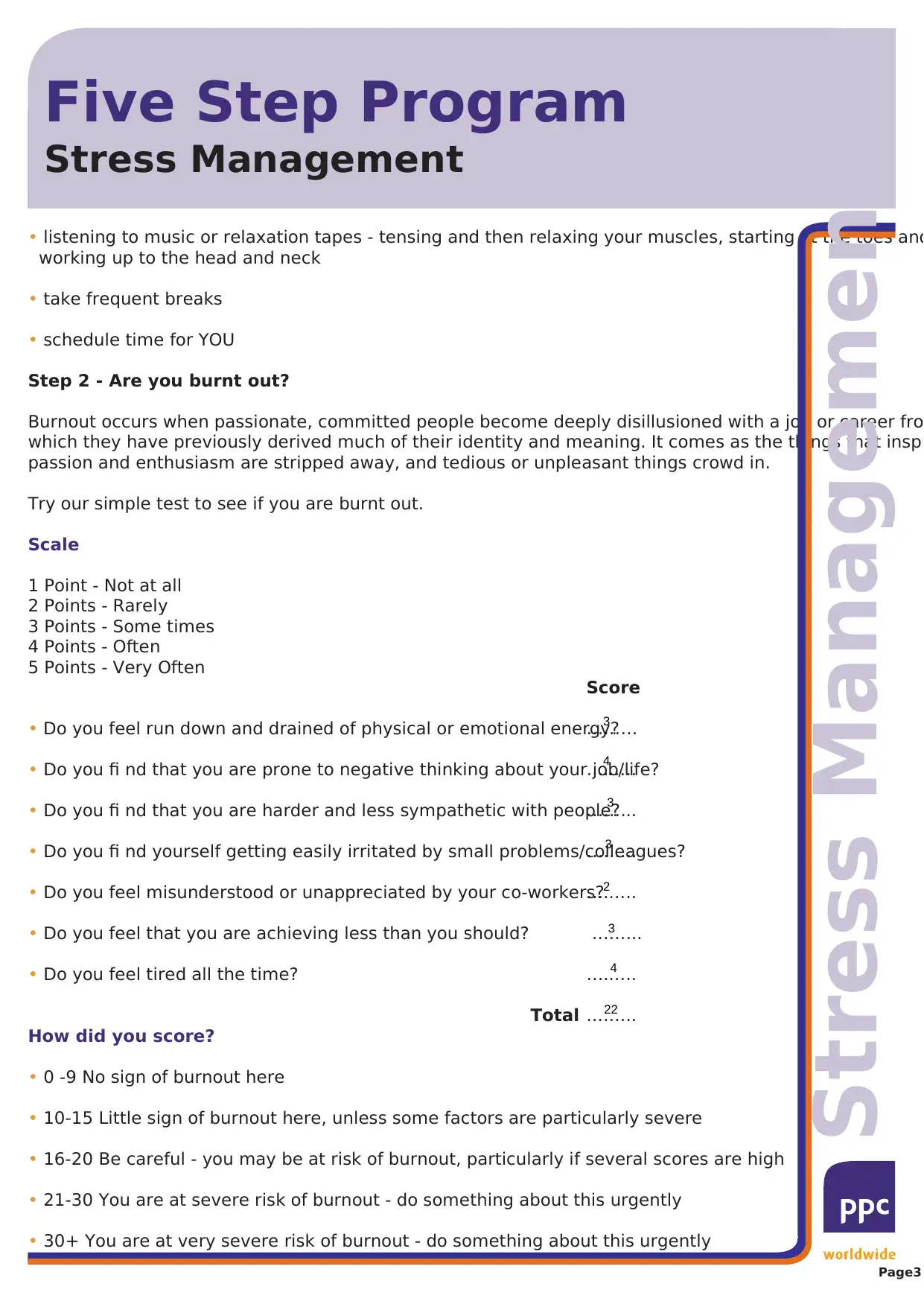
Page3
Five Step Program
Stress Management
• listening to music or relaxation tapes - tensing and then relaxing your muscles, starting at the toes and
working up to the head and neck
• take frequent breaks
• schedule time for YOU
Step 2 - Are you burnt out?
Burnout occurs when passionate, committed people become deeply disillusioned with a job or career fro
which they have previously derived much of their identity and meaning. It comes as the things that inspi
passion and enthusiasm are stripped away, and tedious or unpleasant things crowd in.
Try our simple test to see if you are burnt out.
Scale
1 Point - Not at all
2 Points - Rarely
3 Points - Some times
4 Points - Often
5 Points - Very Often
Score
• Do you feel run down and drained of physical or emotional energy?………
• Do you fi nd that you are prone to negative thinking about your job/life?….…..
• Do you fi nd that you are harder and less sympathetic with people?……...
• Do you fi nd yourself getting easily irritated by small problems/colleagues?….…..
• Do you feel misunderstood or unappreciated by your co-workers?….…..
• Do you feel that you are achieving less than you should? ……...
• Do you feel tired all the time? ….…..
Total .……..
How did you score?
• 0 -9 No sign of burnout here
• 10-15 Little sign of burnout here, unless some factors are particularly severe
• 16-20 Be careful - you may be at risk of burnout, particularly if several scores are high
• 21-30 You are at severe risk of burnout - do something about this urgently
• 30+ You are at very severe risk of burnout - do something about this urgently
Stress Management
3
4
3
3
2
3
4
22
Five Step Program
Stress Management
• listening to music or relaxation tapes - tensing and then relaxing your muscles, starting at the toes and
working up to the head and neck
• take frequent breaks
• schedule time for YOU
Step 2 - Are you burnt out?
Burnout occurs when passionate, committed people become deeply disillusioned with a job or career fro
which they have previously derived much of their identity and meaning. It comes as the things that inspi
passion and enthusiasm are stripped away, and tedious or unpleasant things crowd in.
Try our simple test to see if you are burnt out.
Scale
1 Point - Not at all
2 Points - Rarely
3 Points - Some times
4 Points - Often
5 Points - Very Often
Score
• Do you feel run down and drained of physical or emotional energy?………
• Do you fi nd that you are prone to negative thinking about your job/life?….…..
• Do you fi nd that you are harder and less sympathetic with people?……...
• Do you fi nd yourself getting easily irritated by small problems/colleagues?….…..
• Do you feel misunderstood or unappreciated by your co-workers?….…..
• Do you feel that you are achieving less than you should? ……...
• Do you feel tired all the time? ….…..
Total .……..
How did you score?
• 0 -9 No sign of burnout here
• 10-15 Little sign of burnout here, unless some factors are particularly severe
• 16-20 Be careful - you may be at risk of burnout, particularly if several scores are high
• 21-30 You are at severe risk of burnout - do something about this urgently
• 30+ You are at very severe risk of burnout - do something about this urgently
Stress Management
3
4
3
3
2
3
4
22
⊘ This is a preview!⊘
Do you want full access?
Subscribe today to unlock all pages.

Trusted by 1+ million students worldwide
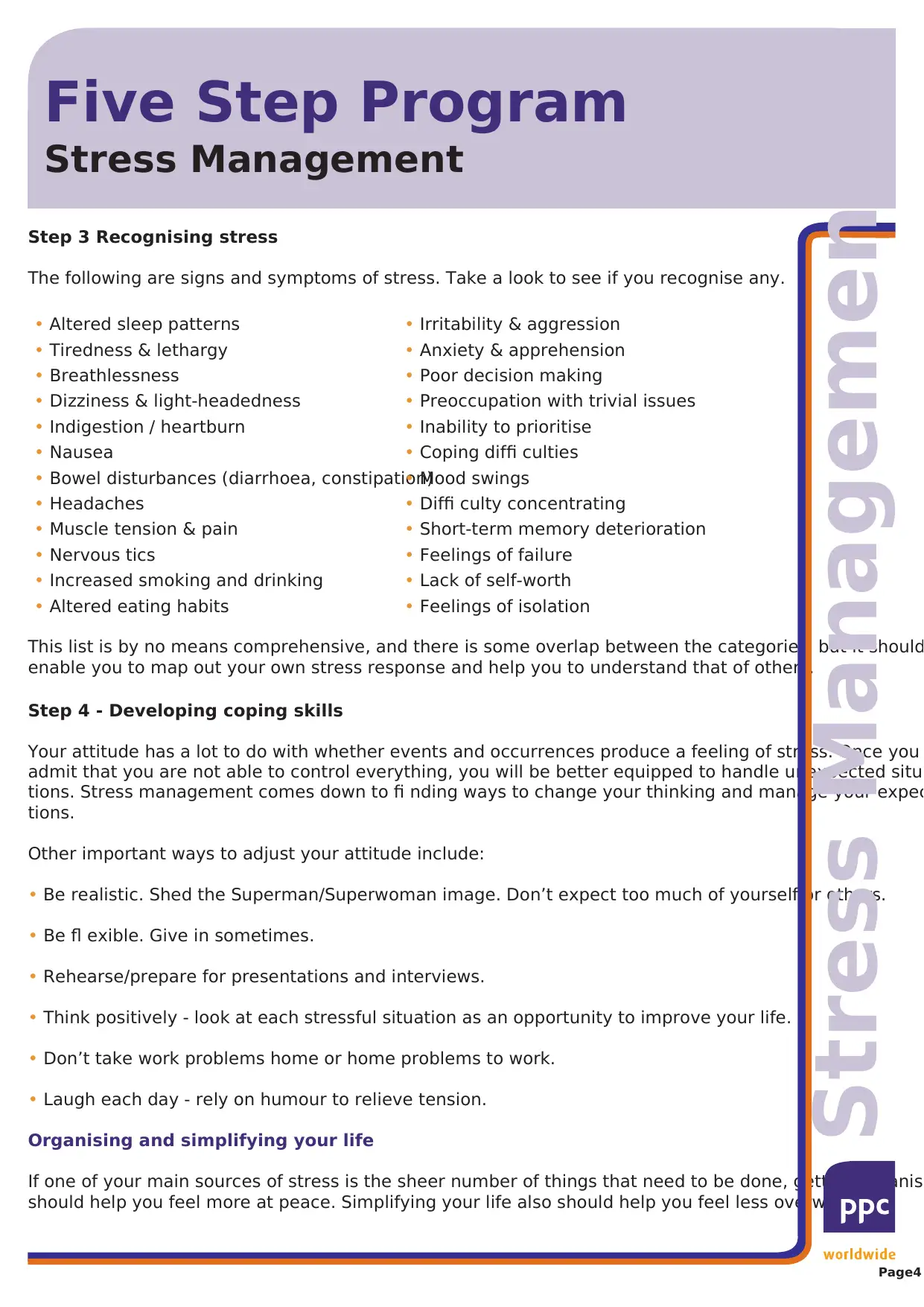
Page4
Five Step Program
Stress Management
Step 3 Recognising stress
The following are signs and symptoms of stress. Take a look to see if you recognise any.
• Altered sleep patterns • Irritability & aggression
• Tiredness & lethargy • Anxiety & apprehension
• Breathlessness • Poor decision making
• Dizziness & light-headedness • Preoccupation with trivial issues
• Indigestion / heartburn • Inability to prioritise
• Nausea • Coping diffi culties
• Bowel disturbances (diarrhoea, constipation)• Mood swings
• Headaches • Diffi culty concentrating
• Muscle tension & pain • Short-term memory deterioration
• Nervous tics • Feelings of failure
• Increased smoking and drinking • Lack of self-worth
• Altered eating habits • Feelings of isolation
This list is by no means comprehensive, and there is some overlap between the categories, but it should
enable you to map out your own stress response and help you to understand that of others.
Step 4 - Developing coping skills
Your attitude has a lot to do with whether events and occurrences produce a feeling of stress. Once you
admit that you are not able to control everything, you will be better equipped to handle unexpected situa
tions. Stress management comes down to fi nding ways to change your thinking and manage your expec
tions.
Other important ways to adjust your attitude include:
• Be realistic. Shed the Superman/Superwoman image. Don’t expect too much of yourself or others.
• Be fl exible. Give in sometimes.
• Rehearse/prepare for presentations and interviews.
• Think positively - look at each stressful situation as an opportunity to improve your life.
• Don’t take work problems home or home problems to work.
• Laugh each day - rely on humour to relieve tension.
Organising and simplifying your life
If one of your main sources of stress is the sheer number of things that need to be done, getting organise
should help you feel more at peace. Simplifying your life also should help you feel less overwhelmed.
Stress Management
Five Step Program
Stress Management
Step 3 Recognising stress
The following are signs and symptoms of stress. Take a look to see if you recognise any.
• Altered sleep patterns • Irritability & aggression
• Tiredness & lethargy • Anxiety & apprehension
• Breathlessness • Poor decision making
• Dizziness & light-headedness • Preoccupation with trivial issues
• Indigestion / heartburn • Inability to prioritise
• Nausea • Coping diffi culties
• Bowel disturbances (diarrhoea, constipation)• Mood swings
• Headaches • Diffi culty concentrating
• Muscle tension & pain • Short-term memory deterioration
• Nervous tics • Feelings of failure
• Increased smoking and drinking • Lack of self-worth
• Altered eating habits • Feelings of isolation
This list is by no means comprehensive, and there is some overlap between the categories, but it should
enable you to map out your own stress response and help you to understand that of others.
Step 4 - Developing coping skills
Your attitude has a lot to do with whether events and occurrences produce a feeling of stress. Once you
admit that you are not able to control everything, you will be better equipped to handle unexpected situa
tions. Stress management comes down to fi nding ways to change your thinking and manage your expec
tions.
Other important ways to adjust your attitude include:
• Be realistic. Shed the Superman/Superwoman image. Don’t expect too much of yourself or others.
• Be fl exible. Give in sometimes.
• Rehearse/prepare for presentations and interviews.
• Think positively - look at each stressful situation as an opportunity to improve your life.
• Don’t take work problems home or home problems to work.
• Laugh each day - rely on humour to relieve tension.
Organising and simplifying your life
If one of your main sources of stress is the sheer number of things that need to be done, getting organise
should help you feel more at peace. Simplifying your life also should help you feel less overwhelmed.
Stress Management
Paraphrase This Document
Need a fresh take? Get an instant paraphrase of this document with our AI Paraphraser
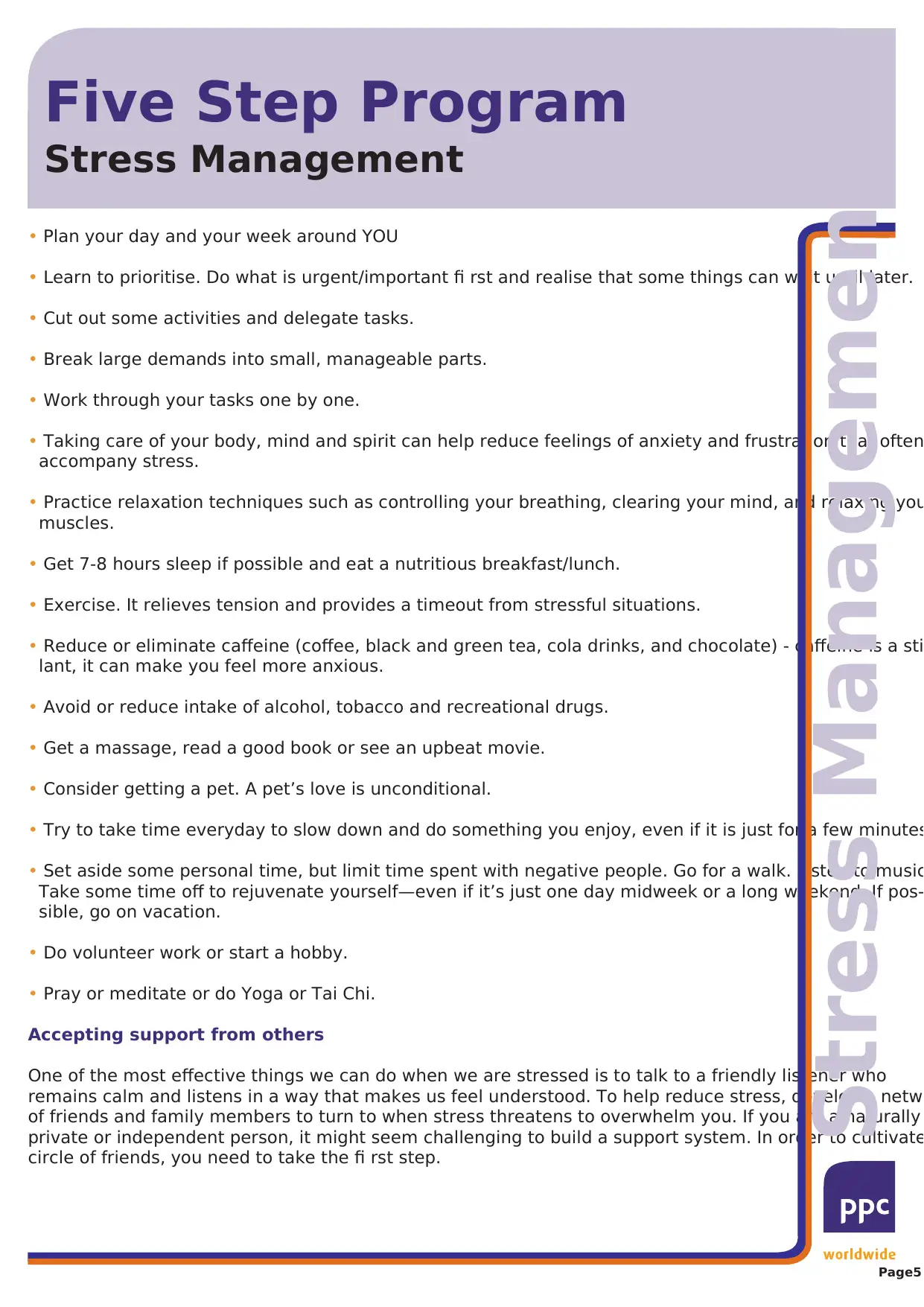
Page5
Five Step Program
Stress Management
• Plan your day and your week around YOU
• Learn to prioritise. Do what is urgent/important fi rst and realise that some things can wait until later.
• Cut out some activities and delegate tasks.
• Break large demands into small, manageable parts.
• Work through your tasks one by one.
• Taking care of your body, mind and spirit can help reduce feelings of anxiety and frustration that often
accompany stress.
• Practice relaxation techniques such as controlling your breathing, clearing your mind, and relaxing you
muscles.
• Get 7-8 hours sleep if possible and eat a nutritious breakfast/lunch.
• Exercise. It relieves tension and provides a timeout from stressful situations.
• Reduce or eliminate caffeine (coffee, black and green tea, cola drinks, and chocolate) - caffeine is a sti
lant, it can make you feel more anxious.
• Avoid or reduce intake of alcohol, tobacco and recreational drugs.
• Get a massage, read a good book or see an upbeat movie.
• Consider getting a pet. A pet’s love is unconditional.
• Try to take time everyday to slow down and do something you enjoy, even if it is just for a few minutes
• Set aside some personal time, but limit time spent with negative people. Go for a walk. Listen to music
Take some time off to rejuvenate yourself—even if it’s just one day midweek or a long weekend. If pos-
sible, go on vacation.
• Do volunteer work or start a hobby.
• Pray or meditate or do Yoga or Tai Chi.
Accepting support from others
One of the most effective things we can do when we are stressed is to talk to a friendly listener who
remains calm and listens in a way that makes us feel understood. To help reduce stress, develop a netwo
of friends and family members to turn to when stress threatens to overwhelm you. If you are a naturally
private or independent person, it might seem challenging to build a support system. In order to cultivate
circle of friends, you need to take the fi rst step.
Stress Management
Five Step Program
Stress Management
• Plan your day and your week around YOU
• Learn to prioritise. Do what is urgent/important fi rst and realise that some things can wait until later.
• Cut out some activities and delegate tasks.
• Break large demands into small, manageable parts.
• Work through your tasks one by one.
• Taking care of your body, mind and spirit can help reduce feelings of anxiety and frustration that often
accompany stress.
• Practice relaxation techniques such as controlling your breathing, clearing your mind, and relaxing you
muscles.
• Get 7-8 hours sleep if possible and eat a nutritious breakfast/lunch.
• Exercise. It relieves tension and provides a timeout from stressful situations.
• Reduce or eliminate caffeine (coffee, black and green tea, cola drinks, and chocolate) - caffeine is a sti
lant, it can make you feel more anxious.
• Avoid or reduce intake of alcohol, tobacco and recreational drugs.
• Get a massage, read a good book or see an upbeat movie.
• Consider getting a pet. A pet’s love is unconditional.
• Try to take time everyday to slow down and do something you enjoy, even if it is just for a few minutes
• Set aside some personal time, but limit time spent with negative people. Go for a walk. Listen to music
Take some time off to rejuvenate yourself—even if it’s just one day midweek or a long weekend. If pos-
sible, go on vacation.
• Do volunteer work or start a hobby.
• Pray or meditate or do Yoga or Tai Chi.
Accepting support from others
One of the most effective things we can do when we are stressed is to talk to a friendly listener who
remains calm and listens in a way that makes us feel understood. To help reduce stress, develop a netwo
of friends and family members to turn to when stress threatens to overwhelm you. If you are a naturally
private or independent person, it might seem challenging to build a support system. In order to cultivate
circle of friends, you need to take the fi rst step.
Stress Management
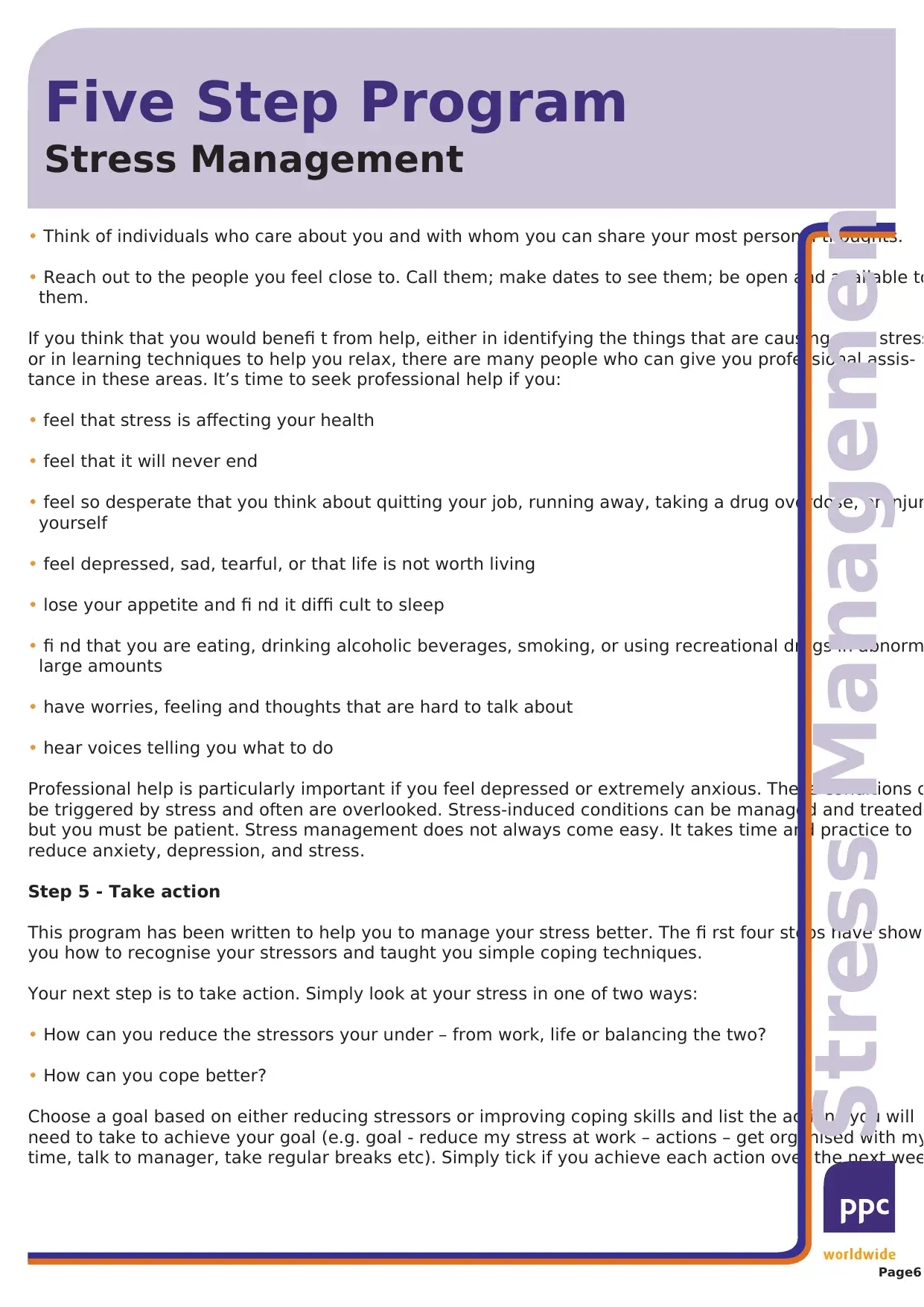
Page6
Five Step Program
Stress Management
• Think of individuals who care about you and with whom you can share your most personal thoughts.
• Reach out to the people you feel close to. Call them; make dates to see them; be open and available to
them.
If you think that you would benefi t from help, either in identifying the things that are causing your stress
or in learning techniques to help you relax, there are many people who can give you professional assis-
tance in these areas. It’s time to seek professional help if you:
• feel that stress is affecting your health
• feel that it will never end
• feel so desperate that you think about quitting your job, running away, taking a drug overdose, or injur
yourself
• feel depressed, sad, tearful, or that life is not worth living
• lose your appetite and fi nd it diffi cult to sleep
• fi nd that you are eating, drinking alcoholic beverages, smoking, or using recreational drugs in abnorm
large amounts
• have worries, feeling and thoughts that are hard to talk about
• hear voices telling you what to do
Professional help is particularly important if you feel depressed or extremely anxious. These conditions c
be triggered by stress and often are overlooked. Stress-induced conditions can be managed and treated,
but you must be patient. Stress management does not always come easy. It takes time and practice to
reduce anxiety, depression, and stress.
Step 5 - Take action
This program has been written to help you to manage your stress better. The fi rst four steps have shown
you how to recognise your stressors and taught you simple coping techniques.
Your next step is to take action. Simply look at your stress in one of two ways:
• How can you reduce the stressors your under – from work, life or balancing the two?
• How can you cope better?
Choose a goal based on either reducing stressors or improving coping skills and list the actions you will
need to take to achieve your goal (e.g. goal - reduce my stress at work – actions – get organised with my
time, talk to manager, take regular breaks etc). Simply tick if you achieve each action over the next wee
Stress Management
Five Step Program
Stress Management
• Think of individuals who care about you and with whom you can share your most personal thoughts.
• Reach out to the people you feel close to. Call them; make dates to see them; be open and available to
them.
If you think that you would benefi t from help, either in identifying the things that are causing your stress
or in learning techniques to help you relax, there are many people who can give you professional assis-
tance in these areas. It’s time to seek professional help if you:
• feel that stress is affecting your health
• feel that it will never end
• feel so desperate that you think about quitting your job, running away, taking a drug overdose, or injur
yourself
• feel depressed, sad, tearful, or that life is not worth living
• lose your appetite and fi nd it diffi cult to sleep
• fi nd that you are eating, drinking alcoholic beverages, smoking, or using recreational drugs in abnorm
large amounts
• have worries, feeling and thoughts that are hard to talk about
• hear voices telling you what to do
Professional help is particularly important if you feel depressed or extremely anxious. These conditions c
be triggered by stress and often are overlooked. Stress-induced conditions can be managed and treated,
but you must be patient. Stress management does not always come easy. It takes time and practice to
reduce anxiety, depression, and stress.
Step 5 - Take action
This program has been written to help you to manage your stress better. The fi rst four steps have shown
you how to recognise your stressors and taught you simple coping techniques.
Your next step is to take action. Simply look at your stress in one of two ways:
• How can you reduce the stressors your under – from work, life or balancing the two?
• How can you cope better?
Choose a goal based on either reducing stressors or improving coping skills and list the actions you will
need to take to achieve your goal (e.g. goal - reduce my stress at work – actions – get organised with my
time, talk to manager, take regular breaks etc). Simply tick if you achieve each action over the next wee
Stress Management
⊘ This is a preview!⊘
Do you want full access?
Subscribe today to unlock all pages.

Trusted by 1+ million students worldwide
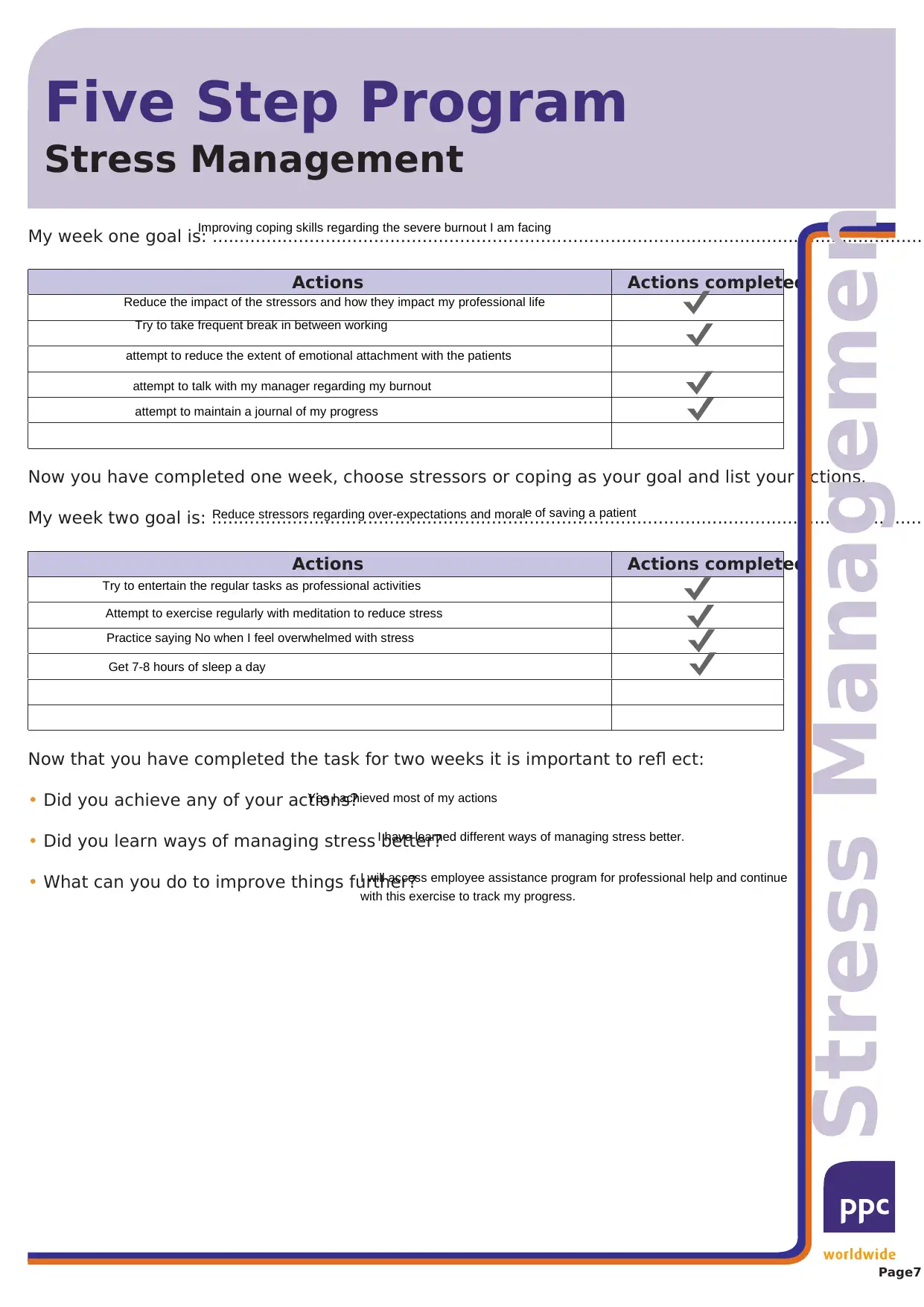
Page7
Five Step Program
Stress Management
My week one goal is: .....................................................................................................................................
Actions Actions completed
Now you have completed one week, choose stressors or coping as your goal and list your actions.
My week two goal is: .....................................................................................................................................
Actions Actions completed
Now that you have completed the task for two weeks it is important to refl ect:
• Did you achieve any of your actions?
• Did you learn ways of managing stress better?
• What can you do to improve things further?
Stress Management
Improving coping skills regarding the severe burnout I am facing
Reduce the impact of the stressors and how they impact my professional life
Try to take frequent break in between working
attempt to reduce the extent of emotional attachment with the patients
attempt to talk with my manager regarding my burnout
attempt to maintain a journal of my progress
Reduce stressors regarding over-expectations and morale of saving a patient
Try to entertain the regular tasks as professional activities
Attempt to exercise regularly with meditation to reduce stress
Practice saying No when I feel overwhelmed with stress
Get 7-8 hours of sleep a day
Yes I achieved most of my actions
I have learned different ways of managing stress better.
I will access employee assistance program for professional help and continue
with this exercise to track my progress.
Five Step Program
Stress Management
My week one goal is: .....................................................................................................................................
Actions Actions completed
Now you have completed one week, choose stressors or coping as your goal and list your actions.
My week two goal is: .....................................................................................................................................
Actions Actions completed
Now that you have completed the task for two weeks it is important to refl ect:
• Did you achieve any of your actions?
• Did you learn ways of managing stress better?
• What can you do to improve things further?
Stress Management
Improving coping skills regarding the severe burnout I am facing
Reduce the impact of the stressors and how they impact my professional life
Try to take frequent break in between working
attempt to reduce the extent of emotional attachment with the patients
attempt to talk with my manager regarding my burnout
attempt to maintain a journal of my progress
Reduce stressors regarding over-expectations and morale of saving a patient
Try to entertain the regular tasks as professional activities
Attempt to exercise regularly with meditation to reduce stress
Practice saying No when I feel overwhelmed with stress
Get 7-8 hours of sleep a day
Yes I achieved most of my actions
I have learned different ways of managing stress better.
I will access employee assistance program for professional help and continue
with this exercise to track my progress.
1 out of 7
Related Documents
Your All-in-One AI-Powered Toolkit for Academic Success.
+13062052269
info@desklib.com
Available 24*7 on WhatsApp / Email
![[object Object]](/_next/static/media/star-bottom.7253800d.svg)
Unlock your academic potential
Copyright © 2020–2026 A2Z Services. All Rights Reserved. Developed and managed by ZUCOL.





